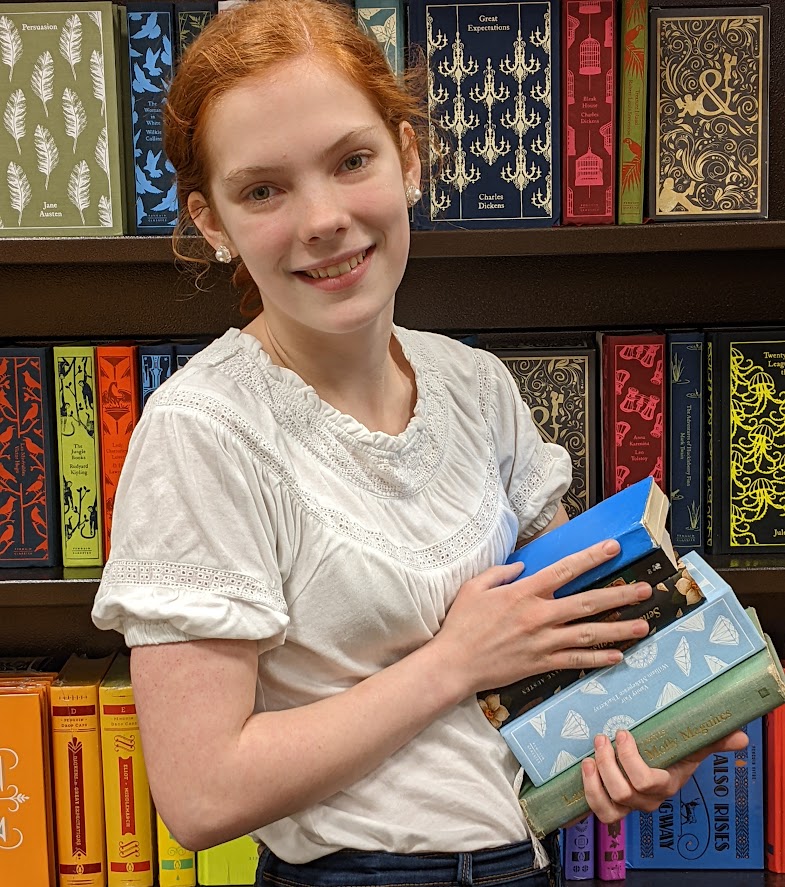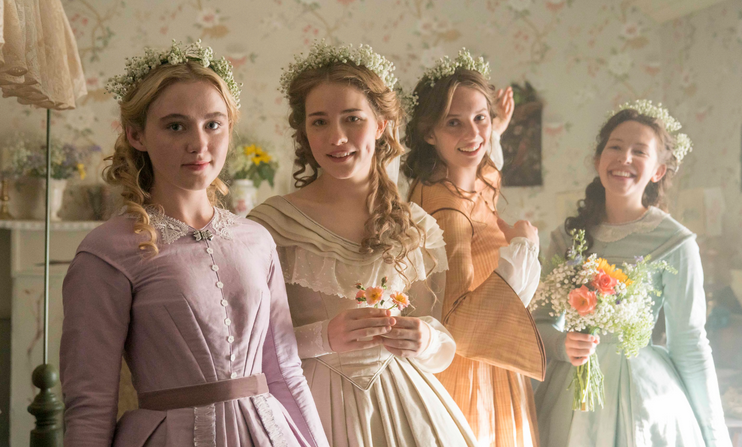The more I read, the more convinced I become that the single biggest factor for creating relatable characters is desire. More than having a fear or a goal or a fun personality, once you understand a character’s desire, every action becomes clear, and each plot point has a special meaning. It impacts the characters (and therefore the reader) in a special way because of the desire of the protagonist.
Desire becomes like a lens that you (and the characters) read each event and action through. You could follow a different character with the same goal, flaw, and fun personality, and the book would be completely different because you are viewing everything through a different lens.
What exactly is a desire, you might ask? What makes it different from a goal? And how can it change so much for your story? That’s exactly what we’re exploring in this article, by comparing Jo from the Little Women novel to the Jo from the musical adaptation.
Little Women
The Little Women novel is one of my favorite classics. Each of the characters (but especially Jo) have relatable desires, goals, and flaws, both in the book and in the musical adaptation. There were several things that I would have changed about the play’s writing (because, you know, the book is always better), but one specific choice stands out especially.
Although Jo From The Book and Jo From The Musical both go through the same events, make the same choices, and take the same actions, the two characters came across as almost completely different people. In fact, the entire play has an entirely different tenor than the book. The reason for this is because Jo, as the protagonist, has two completely different desires.
Jo from the Novel
In both the book and the movie, Jo spends tireless hours sending her work off to multiple publishers only to receive rejections from all of them. Her goal is pretty clear here: She wants to have her work published. In both forms of storytelling, Jo takes the same actions and works through the same challenges, and her character changes in some similar ways throughout the difficulties. In storytelling, your protagonist’s goals tend to be easy to spot, straightforward, and often similar for the larger part of your cast.
But their desires are often very different.
And you can find those by asking “Why?”
Why does Jo want her work to be published so badly? What makes this goal personal to her as a character?
In the book, Jo wants to use the money to be able to help her family. She finds purpose and joy in knowing that she is working and hoping for a better life for her and her family — one where money isn’t so tight, where her sisters can afford nice dresses and aren’t ashamed to work all day. We learn within the first few pages that Jo doesn’t care much about dresses and approval from her peers. She would spend her money on entirely different things — plenty of writing paper and pens, as well as a shelf full of her favorite books — but she already has those things. She is almost entirely content as it is, yet she still possesses an incessant drive to keep working. Why?
Because she wants to make life better for her family. She isn’t interested in fame or riches or the approval that would come with being one of America’s youngest published authors. She isn’t interested in succeeding simply for success’s sake (we see this clearly in her lack of commitment to her academics) or being free to live however she wants. She wants to be the provider and protector she had promised her father she would be while he was off at war. She wants to be for her family everything they haven’t had. She wants to make her family the picture-perfect image they always dreamed of.
When Beth dies, so do her dreams of the picture-perfect family. She has to let go of the part of her that thinks she can solve everything and learn to do the best she can solely for the sake of others — even if that sometimes means doing tasks that are simpler and supposedly less significant that writing words of unequivocal influence.
But throughout it all, Jo’s one desire is to lift her family out of difficult circumstances. Through all the change and development her character endures throughout the book, her purpose is clear. Even though her goals change wildly over the work — from getting her hair cut to wanting to enact revenge on her sister, Amy, and working tirelessly to get her book published — her desire stays the same.
She wants to cut her hair so that she can sell it and get money for her mother to visit her possibly dying father. She wants to enact revenge on Amy because Amy burned the book that her father made her promise to finish before he returned from the war. She works to get her writing published because it would help lift her family closer to the dream she has of a happy, healthy, perfectly content.
Everything makes sense in this lens, and the resolution is satisfying because, on the whole, most of Jo’s family learns to grow in contentedness and gratitude. The family is not the picture-perfect image Jo dreamed of, but each of her family members are content where they are. The book closes with Jo dreaming up ideas of working even harder for a new family — the one she plans to make with Professor Bhear.
Jo from the Musical
On the other hand, things look very different for the Jo of the Little Women Musical. Although this Jo goes through many of the same adventures and trials that the Jo of the book did, her driving desire is very different, and thus her entire character is changed. In the song Astonishing, Jo cries out her deepest desire while wrestling through relationships that are changing more quickly than she could imagine. She states that she once thought home was all she’d ever need, but now she knows that there must be something more for her. She’s sure that there is a pull of adventure meant just for her that will lead her far from the simple life she’s always known, and that someday she will be truly astonishing. What is Jo’s deepest desire?
To find meaning in her life through adventure and admiration from others. Suddenly, every event in Jo’s life looks different. Beth’s illness changed her, but instead of showing her that “insignificant” work can often turn out to be meaningful, it shows her that her family isn’t permanent. The dreams she had for them have become impossible, and it’s time for her to move on from her small hopes to more “giant plans,” where everyone is astonished by her life’s work and thrilled by her daring adventures.
Jo begins the play planning to be astonishing to her family — she’ll see her name in print and maybe even make them wealthy enough to be comfortable. She’ll win the admiration of her insufferable aunt and tour Europe like a rich young woman. But as the play progresses she begins to see those plans as small. She goes to a huge, bustling city and realizes that there are people within it who started out just like her — penniless and unknown — who ended up admired and wealthy. She longs to be one of those — to find her name in a history book and astonish everyone around her.
Throughout it all, Jo’s one desire is to achieve adventure and admiration. She wants to cut her hair so that she can feel the thrill of trying something new. She wants to enact revenge on Amy because Amy is standing between her and finishing her book, which she hopes will be just as astonishing to the publishers as it is to her family. She works herself to the bone writing to publishers who don’t care one bit about her work because she knows that someday it will pay off, and she will “shine as brightly as the sun.” She longs to find adventure, praise, and admiration, all while standing on her own two independent feet.
But the ending is no longer satisfying.
Jo has not achieved adventure, she has not reached astonishing heights of fame. All she has done is made her home a better place than when she left it, and she has expressed no satisfaction with this resolution. We’re left wondering if she ever grows to be astonishing, or if she ever grows past making her fame the center of her world.
Don’t get me wrong, this desire would have been perfect for a different character. It would have been fascinating to watch a young girl in the Victorian era travel to a bustling city and attempt to make her mark on the world with her writing.
But that character is not Jo.
Even though she went through the same circumstances, faced the same challenges, and responded in a very similar fashion, she doesn’t seem like the same person and the ending does not resolve her desires.
Desires matter very much to each individual character. They can take a work from seeming unresolved and messy to becoming satisfying and clear (or the other way around, in this case). They can also take even the most closed-off, unrelatable personalities and turn them into the most cheered-for character in your work. Your character’s desire is one of the most powerful tool you have as a writer. So go write some relatable protagonists!



What protagonists do you relate to the most? Do they share a similar desire to yours? What other works have you read or watched where the plot didn’t fit with the character’s desire? What characters are you working on right now? And how was the article? Too sweet? Too sour? Just right? Comment below and let us know!


Hi! My name is Mara, and I’m a Christian artist, violinist, and blogger. I remember the day that I decided that I would learn something new about what makes a good story from every book I picked up — whether it was good, bad, or a mixture of both. I use this blog as a way of sharing some of the tips and tricks I’ve learned, and highlight which books, cartoons, and movies have taught me the most about writing an awesome story.


Having never read the book, nor watched the musical, I can’t say from my own experience: but that must’ve been so disappointing! To think that this person you knew is now someone you don’t. Ouch!
You should read the book! It’s definitely worth it. (And convert Sophia.)
I loved this! I have to say, there’s just something different about your girls’ blog and I am loving it so much.
The protagonist I relate to most may be Jo AND Amy AND even Meg a little bit. Maybe also even Amy. They have that timeless human essence, you know?
Outisde of Little Woman, it may be Hattie from Hattie Big Sky. Longing to make a place home and belong, and Bastiaan from Wishtress by Nadine Brandes, wanting to use your gift to serve God and others and learning how to do that with Him in joy.
Right now I’m working on a character who is torn from all they know, and one who seeks to protect just a little bit too much.
In response to your last question, I would say you’ve hit the nice middle ground here 😉
Thank you for sharing your work with us, Mara! x
Awww, thank you so much, Iona! We’re so happy to have you!
I relate to each protagonist in a new way every time I read Little Women, so I completely understand your struggle. There’s definitely something about each of them that is timeless and always relatable!
Good luck with your work in progress! I know you can get it out into the world, and I can’t wait to see it happen!